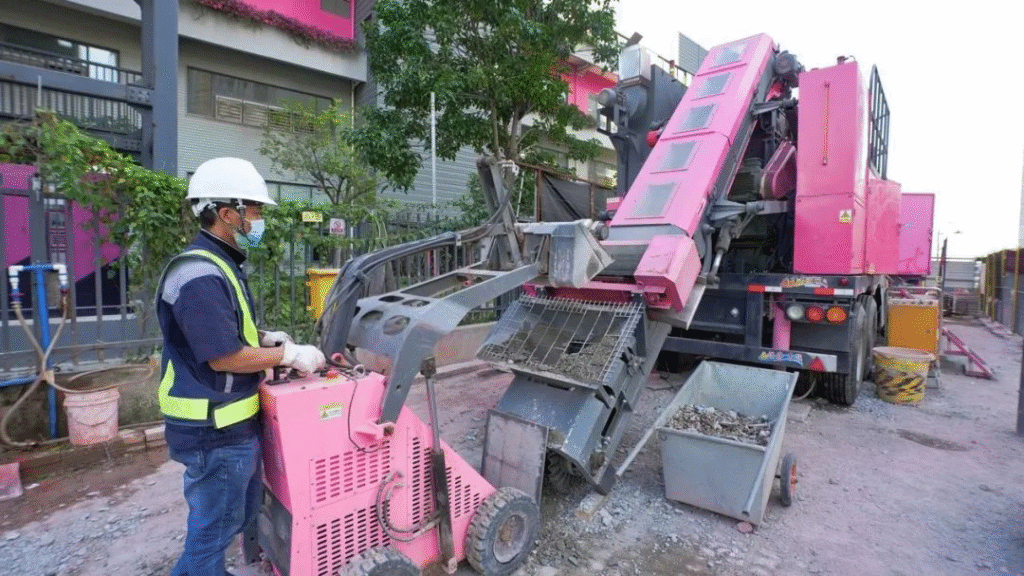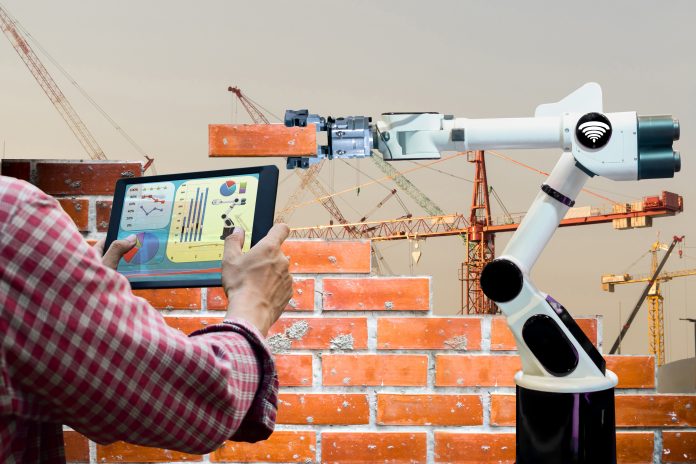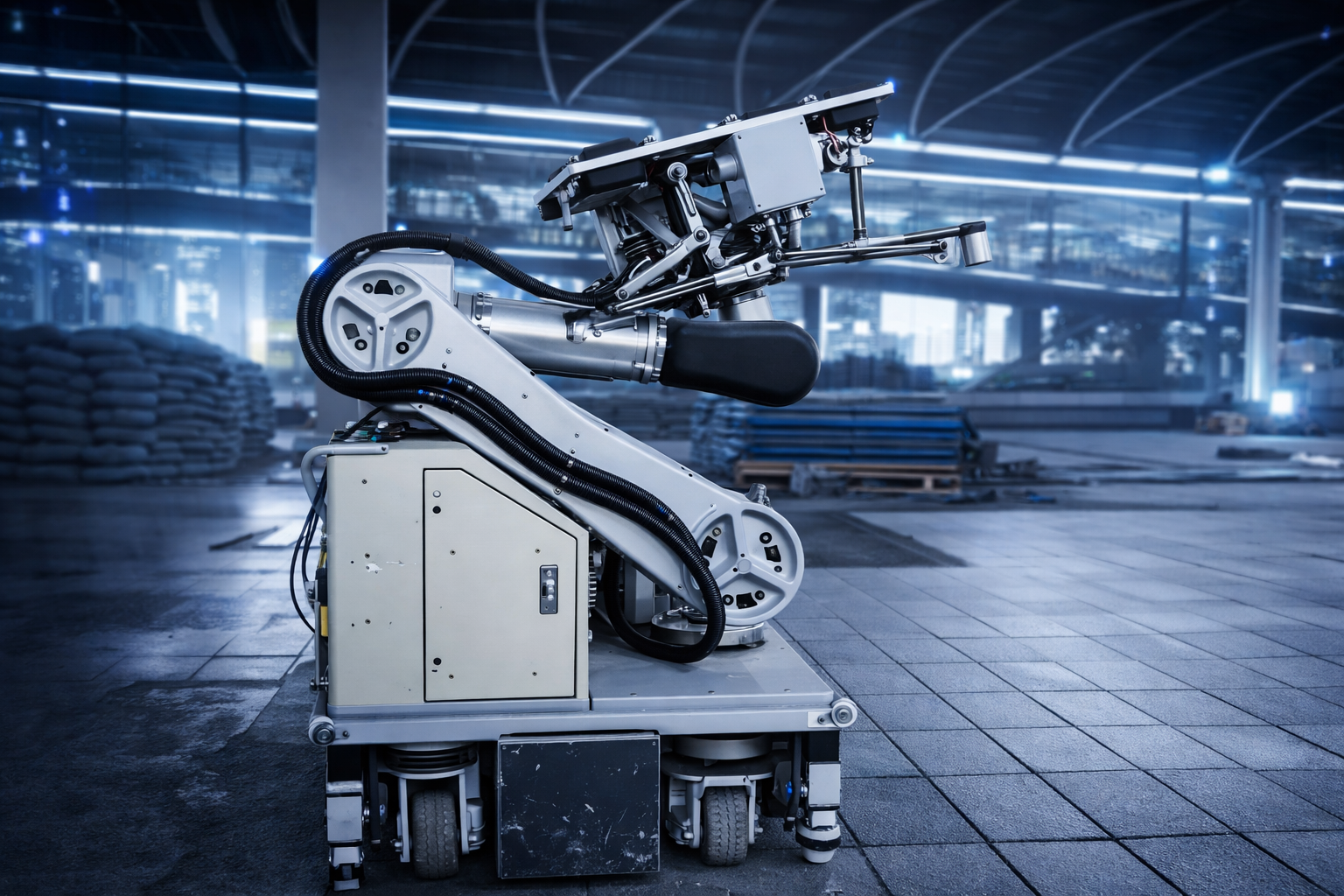AI robots are replacing manual construction! It is expected that by 2026, AI revenue in the construction industry will reach 2.6424 billion US dollars
AI technology has had a transformative impact on global industries. As one of the least digitized industries in the world, the construction industry can benefit greatly from the adoption of AI technology. The application of artificial intelligence in the construction industry can help companies improve efficiency, enhance quality, improve performance, and improve site safety.
According to a report by McKinsey, the annual output value of the construction industry exceeds $10 trillion, equivalent to 13% of the world’s GDP. Through digitization alone, market capitalization can increase by $1.6 trillion annually. This makes the construction industry one of the largest industries in the world economy. It is expected that by 2026, the revenue of AI in the construction industry will reach 2.6424 billion US dollars.

Understanding AI in Intelligent Buildings
AI and machine learning technologies are disrupting every stage of the construction industry, from design to operations and asset management. This technological advancement has brought significant improvements in terms of time and cost-effectiveness, especially in the planning and design sub fields.
The application of artificial intelligence in building management can help improve the safety, speed, accuracy, and efficiency of operations. With the help of AI building solutions, companies can proactively monitor potential hazards on construction sites and address critical issues to prevent accidents from occurring. Machine learning techniques can analyze large amounts of data to optimize designs, achieve energy efficiency, and cost savings. Robotic Process Automation (RPA) can improve the speed and quality of construction. In short, AI in the construction industry is changing the way businesses design, execute, and manage projects. With the continuous expansion of AI usage, it is becoming increasingly important for enterprises to adapt to this emerging technology.
The use of generative AI in the construction industry is bringing about significant changes, enabling architects and engineers to explore a wide range of innovative design possibilities. By analyzing vast datasets, generative AI algorithms can generate multiple design alternatives, each optimized for efficiency, sustainability, and cost-effectiveness. This technology accelerates the design process while achieving more creative and precise solutions, significantly improving the quality and outcomes of construction projects.
The Use Cases and Applications of AI in Building Management
Architecture and AI are closely connected. This technology is a key factor in fundamentally changing the construction industry, addressing key challenges such as cost, safety, and overspending. You can utilize AI throughout the entire construction project, from ideation, design, bidding, financing, transportation and operation to asset management. This helps achieve unprecedented levels of accuracy and efficiency.
For example, AI driven quality control systems can help detect defects early, predictive maintenance can minimize equipment downtime, and supply chain optimization can ensure timely material delivery. These AI use cases and examples in architecture highlight the transformative impact of this technology on simplifying processes and enhancing building management project outcomes.
Planning and Design
The AI based Building Information Modeling (BIM) process has been helping professionals in architecture, engineering, and construction to create 3D models for efficient planning, design, construction, and restoration of buildings and infrastructure. In construction, machine learning technology uses AI driven generative design to identify and collaborate with architects, engineers, mechanics, electricians, and plumbers to ensure that conflicts do not arise between sub teams. These measures reduce the risk of rework.
AI and machine learning technologies explore all options and variants of solutions in construction to create design alternatives. Create a model with multiple variants and make improvements in each iteration. This iterative method continues until the optimal model is obtained, ensuring the creation of a perfect design.
Measure the progress of the construction site
Construction companies can use AI powered robots equipped with cameras to capture 3D images at construction sites. With the help of neural networks, these images can be cross checked with information from BIM and bill of materials. Engineers managing large projects use this information to track progress.
It also helps identify quality errors in the early stages while tracking financial information and schedules. It is not an exaggeration to say that the application of robots and AI in the construction industry ensures the delivery of the best construction projects while saving costs and time.
Powerful fleet management
Construction companies are utilizing the capabilities of the Internet of Things (IoT) to manage fleets of devices and vehicles. By utilizing AI driven metrics, the Internet of Things has achieved real-time location tracking, predictive maintenance, fuel and battery monitoring, and more.
By integrating IoT driven solutions, construction companies can efficiently predict equipment failures and solve problems, resulting in significant time and cost savings.
Risk mitigation
Every construction site is prone to some risks, such as safety hazards, quality issues, delays, and cost overruns. The larger the project, the higher the risks involved, as there are multiple subcontractors working in parallel on the construction site. By utilizing machine learning and AI building solutions, general contractors can monitor and mitigate risk instances on construction sites, allowing project teams to focus on their core functions.
AI algorithms will automatically prioritize issues such as unsafe scaffolding, flooding, and lack of necessary protective equipment (such as gloves, helmets, and safety goggles) for personnel. The application of AI in building safety enables contractors to prioritize projects based on risk ranking and proactively address potential safety hazards.
Relieve labor shortage
The construction industry always lacks labor because this job involves risks and high physical requirements. The average turnover rate in the construction industry is much higher than other industries. In this scenario, AI driven robots enable project managers to monitor real-time situations and resource requirements across multiple construction sites.
According to project requirements, labor can be transferred to different parts of the project or different construction sites. Robots monitor construction sites to identify problematic areas. For example, an AI driven robot called “Spot the Dog” scans construction sites at night to monitor progress. It enables contractors to increase productivity, especially in remote areas lacking skilled labor.
predictive analysis
AI algorithms can analyze large amounts of data collected from sensors, IoT devices, and historical project data to provide predictive analysis. This enables construction companies to predict potential issues and take proactive action before they occur, thereby avoiding interruptions in work.
This helps improve project planning, worker safety, and decision-making. According to a report by McKinsey, implementing predictive maintenance strategies can reduce machine downtime by 30-50% and extend its lifespan by 20-40%.

How can AI drive the development of intelligent buildings?
Companies hoping to maintain a leading position in this fiercely competitive era should quickly upgrade their infrastructure and redefine their operational strategies using AI technology.
Improve construction site productivity
Construction companies use autonomous driving machinery to automate repetitive tasks such as pouring concrete, welding, bricklaying, and demolition. Similarly, they can use autonomous or semi autonomous bulldozers for excavation and preparation work. Once the exact specifications of these machines are inputted, they will complete their work according to the specifications, thus freeing up manpower for actual construction work. This reduces the time and manpower risk required to complete the task. In addition, project managers can utilize AI technologies such as facial recognition and on-site cameras to assess worker productivity and track construction site work in real-time.
Enhance project design
The use of AI in architecture can significantly enhance project design. By analyzing a large amount of design data, AI algorithms can identify patterns, optimize layouts, and propose design improvement suggestions. This helps architects, engineers, and designers simplify the design process, improve efficiency, and create more innovative and optimized structures.
AI driven design tools can also simulate different scenarios, evaluate structural integrity, and assess energy efficiency, enabling informed decision-making and reducing the risk of design defects. Integrating generative AI into the architectural design process can lead to more efficient, cost-effective, and sustainable building projects.
Collect and analyze data
Building AI solutions (such as robots equipped with cameras, autonomous devices, etc.) collect data in different formats. By inputting these details into a deep neural network, the system can automatically classify project progress from multiple perspectives. These data enable management to identify and solve problems in the early stages, even the smallest errors or issues, thereby avoiding major problems in the later stages.
Efficient land surveying
AI technology can greatly shorten the time required for detailed land surveys and taking aerial photos of construction sites to better manage projects. With the help of drones, geographic spatial information systems (GIS), and geographic spatial AI (GeoAI), project progress and issues on construction sites can be tracked.
Automated project management
Manually completing construction work may be tedious, time-consuming, and prone to errors. Project managers often find themselves busy assigning tasks and managing staff records. AI in construction project management can efficiently automate these tedious tasks, reduce errors, and free up valuable time and resources. AI automation can allocate tasks based on employee data, optimize workflows, and enable workers to focus on their professional areas, thereby improving overall productivity.






